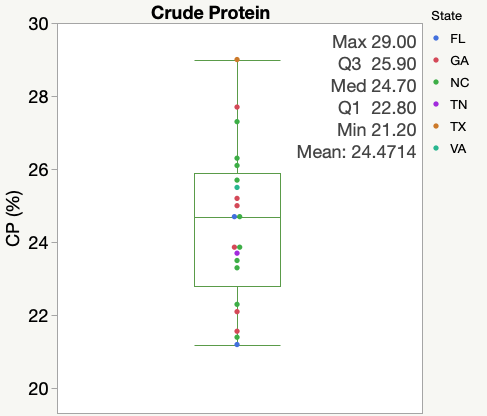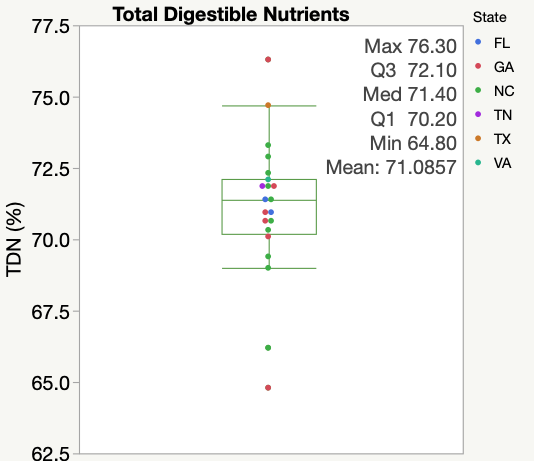High Quality Alfalfa (Also) Comes From North Carolina
go.ncsu.edu/readext?866201
en Español / em Português
El inglés es el idioma de control de esta página. En la medida en que haya algún conflicto entre la traducción al inglés y la traducción, el inglés prevalece.
Al hacer clic en el enlace de traducción se activa un servicio de traducción gratuito para convertir la página al español. Al igual que con cualquier traducción por Internet, la conversión no es sensible al contexto y puede que no traduzca el texto en su significado original. NC State Extension no garantiza la exactitud del texto traducido. Por favor, tenga en cuenta que algunas aplicaciones y/o servicios pueden no funcionar como se espera cuando se traducen.
Português
Inglês é o idioma de controle desta página. Na medida que haja algum conflito entre o texto original em Inglês e a tradução, o Inglês prevalece.
Ao clicar no link de tradução, um serviço gratuito de tradução será ativado para converter a página para o Português. Como em qualquer tradução pela internet, a conversão não é sensivel ao contexto e pode não ocorrer a tradução para o significado orginal. O serviço de Extensão da Carolina do Norte (NC State Extension) não garante a exatidão do texto traduzido. Por favor, observe que algumas funções ou serviços podem não funcionar como esperado após a tradução.
English
English is the controlling language of this page. To the extent there is any conflict between the English text and the translation, English controls.
Clicking on the translation link activates a free translation service to convert the page to Spanish. As with any Internet translation, the conversion is not context-sensitive and may not translate the text to its original meaning. NC State Extension does not guarantee the accuracy of the translated text. Please note that some applications and/or services may not function as expected when translated.
Collapse ▲High quality alfalfa is produced in North Carolina. It is a fact…!!! For some people, the previous statement may be surprising; however, the quality of alfalfa produced in North Carolina has consistently been recognized in regional hay quality contests, like the Southeastern Hay Contest. Quality, in this case, is defined as the ability of the hay to meet the nutritional demand of livestock. High levels of crude protein (CP) and total digestible nutrients (TND) are desirable.
Records of alfalfa samples from North Carolina placing in the top-3 positions in the Alfalfa Hay category of the Southeastern Hay Contest start in 2015 (Table 1). Since then, North Carolina’s alfalfa samples have consistently placed in the top-3 positions, not skipping a single year. Records of the contest are available online since 2006; however, the Alfalfa Hay category was first set in 2015. From 2006 to 2014, samples of alfalfa and other legumes competed in the same category. A huge exception was the year 2021, where all the top-3 positions in the Alfalfa Hay category were awarded to samples from North Carolina.
Table 1. Alfalfa Hay Category winners. Data retrieved from the Southeasthern Hay Contests website. Highlighted in green are the samples from North Carolina. CP = crude protein; TDN = total digestible nutrients; RFQ = relative forage quality.
Information that can be inferred from the previous records include:
- Out the 118 alfalfa samples total submitted for competition during this 7-yr period of (2015-2021), the winner samples (top-3 positions) come from 11 farms representing six states (Florida, Georgia, North Carolina, Tennessee, Texas, and Virginia).
- Sample entries from two farms, one from Georgia and one from North Carolina, are tied, having placed at least four times in the top-3 categories.
City, State # of times ranked top-3 Climax, NC 1 Idalou, TX 1 Madison, GA 4 Malone, FL 2 McKenney, VA 1 Murrayville, GA 1 Peachland, NC 4 Pulaski, TN 1 Summerville, GA 1 Taylorsville, NC 3 Valdese, NC 2 - Average crude protein (CP) and total digestible nutrients (TND) were 24% and 71% (n = 21). A distribution of the results is shown in the figures below.
Following the contest’s motto, “prove your hay is the best”, this data further proves the high quality of the alfalfa that is produced in North Carolina.





